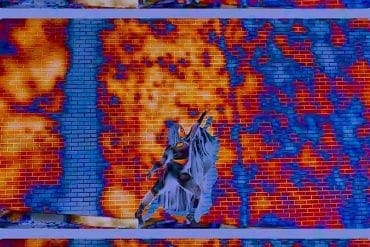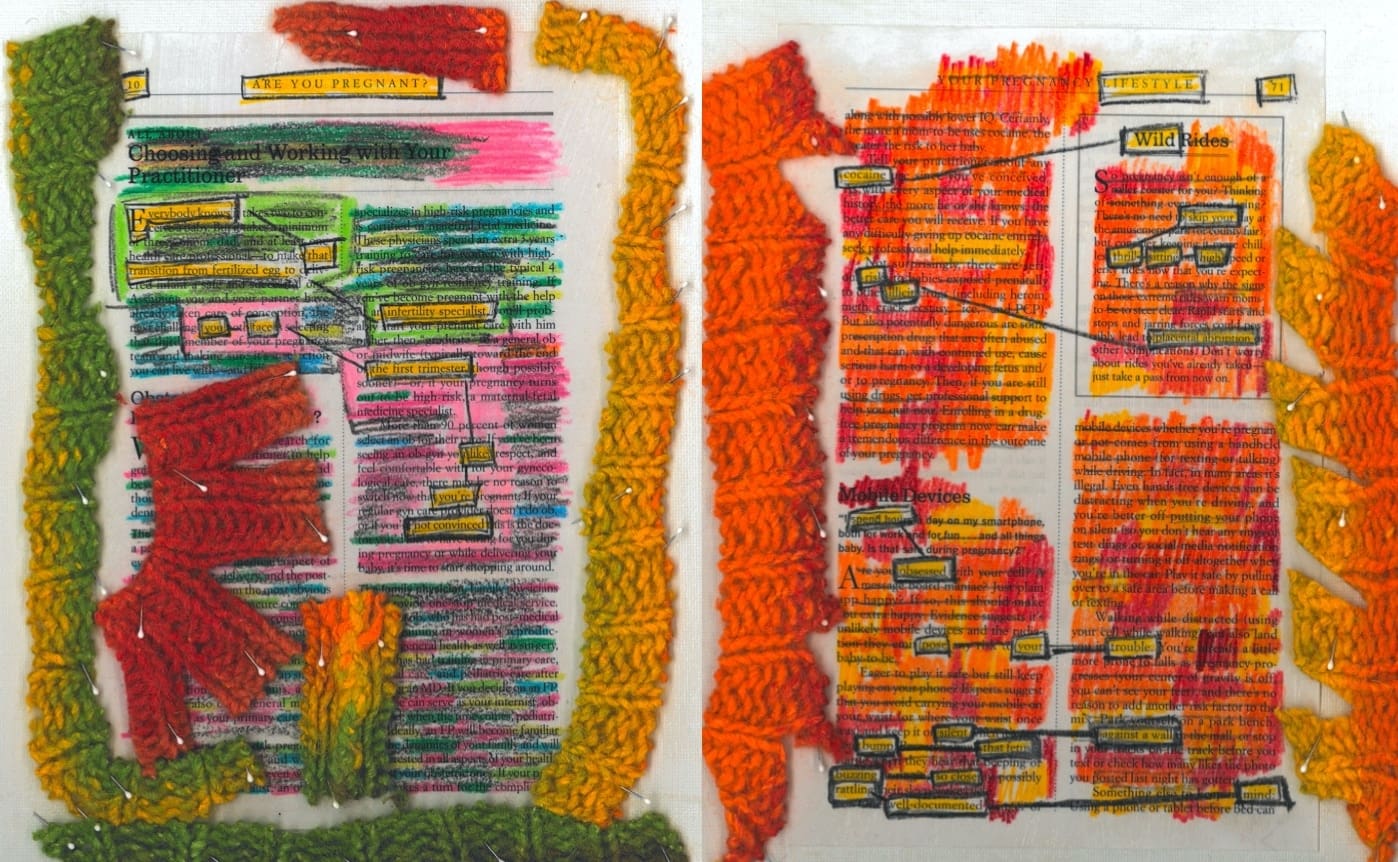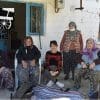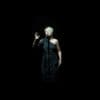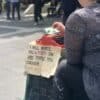Collage and Erasure Poems: “Bringing Up Baby”
“Bringing up Baby” is a collection of collage and erasure poems about pregnancy and mothering created from felted wool, applique pins, crayon, markers, stickers, photos, book pages, crib placards, pediatrician instructions, language, and family artifacts that function as praise for and critique of (white) mothering. The collection of mother poetry contains two types of collage and erasure poetry: “What to Expect,” which are erasure poems from a pregnancy advice manual (see left side of slide) and “Baby Book,” which includes erasure and collage of feminist texts, my baby book, and material scraps of my daughter’s early years.
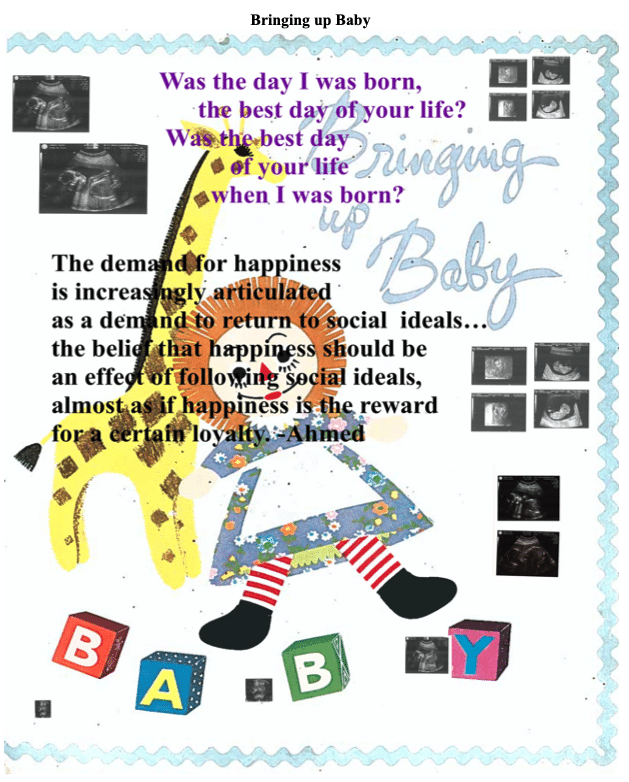
Bringing up Baby
“Was the day I was born the best day of your life? Was the best day of your life when I was born?” My daughter asks on a scooter ride around the block. I let the dogs sniff the dead squirrel rotting by the neighbor’s tree.
“The demand for happiness is increasingly articulated as a demand to return to social ideals… The belief that happiness should be an effect of following social ideals, almost as if happiness is the reward for a certain loyalty.” (-Sarah Ahmed)
Do not lie. Do not quit.
My mother’s advice, part of me, my body, the way I move through this task of mothering are stitched into my answer.
As I explained in my recent podcast here at The AutoEthnographer, collage can be a form of visual poetry. It can be a form of textual poetry. What it means is that you’re juxtaposing existing elements into something new, so you’re taking preexisting parts and arranging them. Collage poetry can include visual elements. You can juxtapose different texts like found poetry and cut up poetry and include different visual elements. The idea is that collage contains a mix of visual, audio, and textual components, and it’s great for when you want to create some kind of multi-dimensional work, and you know this can work well on the page. It can also work well 3-dimensionally. We could also think about incorporating elements of video as well.
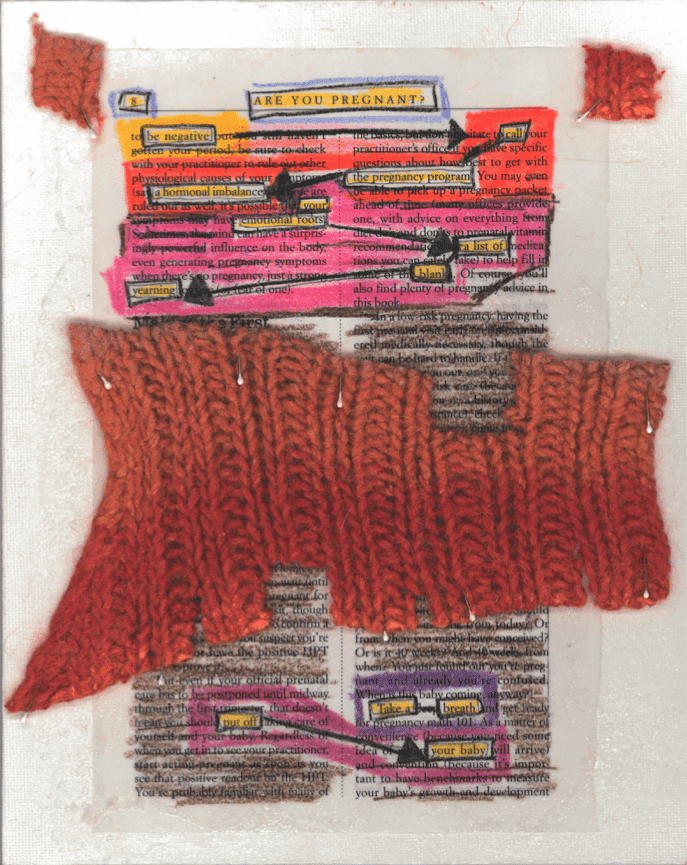
Are You Pregnant?
be negative call
the pregnancy program
a hormonal imbalance
your
emotional tools
a list of
blank
yearning
Take a breath
put off
your baby
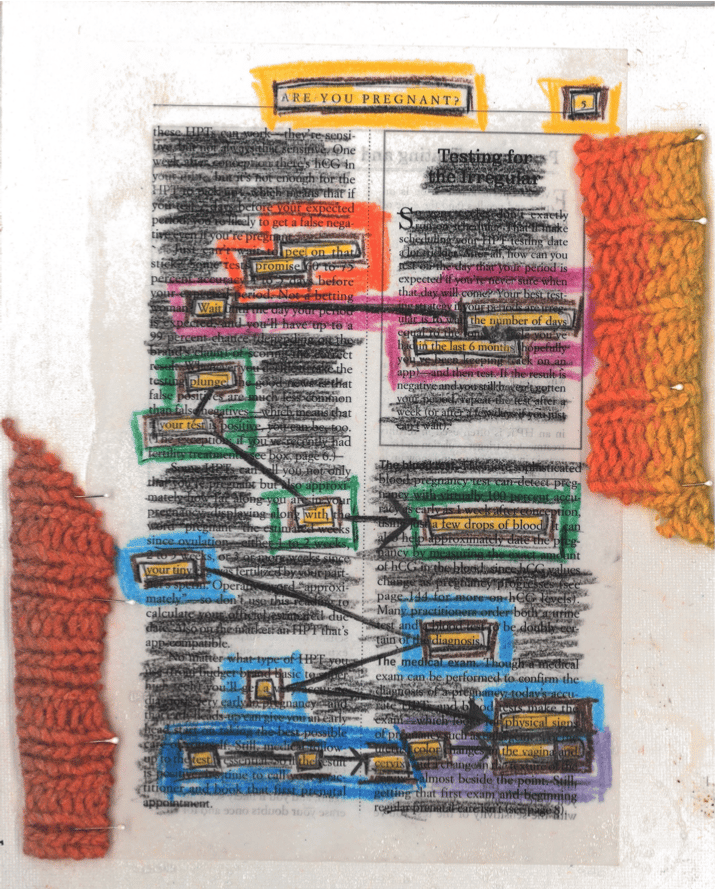
ARE YOU PREGNANT? 5
pee on that
promise
Wait the number of days
in the last 6 months
plunge
your test
with a few drops of blood
your tiny
diagnosis
a
physical sign
color the vagina
test the cervix
My Creative Collage and Erasure Process
In the “What to Expect”1 pieces, I use erasure and collage with pages from What to Expect When You Are Expecting, a popular guide to pregnancy and childbirth that I found insulting, highly heterosexist and hegemonic when I was gifted it by my Obstetrician’s office. At first, I read the guide to be a good pregnant woman and new mother who is self-abnegating and completely fulfilled by feminine breeding, but it was frustrating and made me feel more than inadequate. I finally quit advice manuals when my daughter was 4 months old.
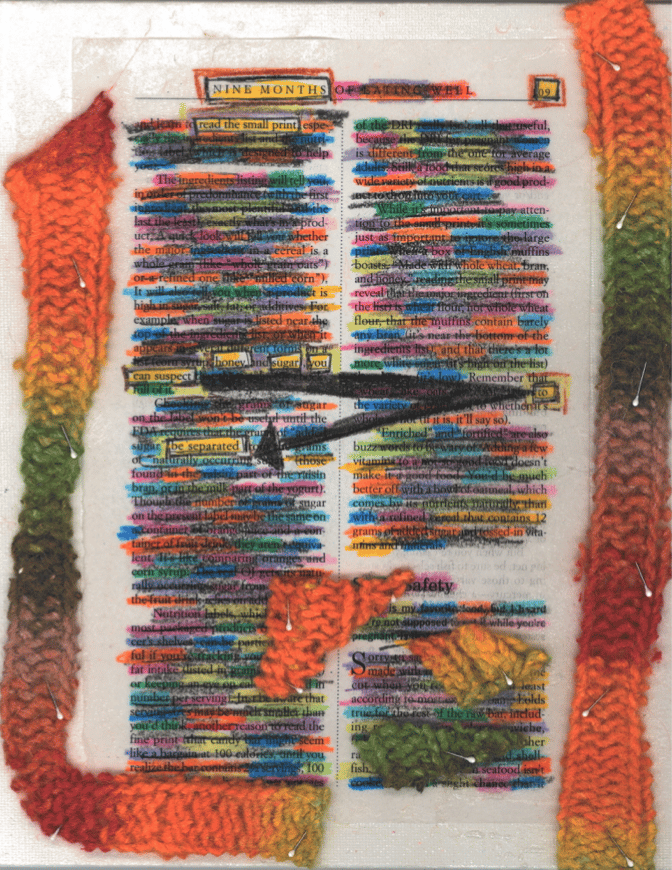
Nine Months
read the small print
honey sugar you
can suspect
to
be separated
I created six pieces using the pages of the book that correspond to my birthday and my daughter’s birthday. Using leftover crayons and pencils from my daughter’s art projects to erase some words and highlight others, I tell another more nuanced story of pregnancy, the story of an ambivalent, though intended pregnancy. I also recycled pieces of a sweater I knit that accidentally got felted in the wash.
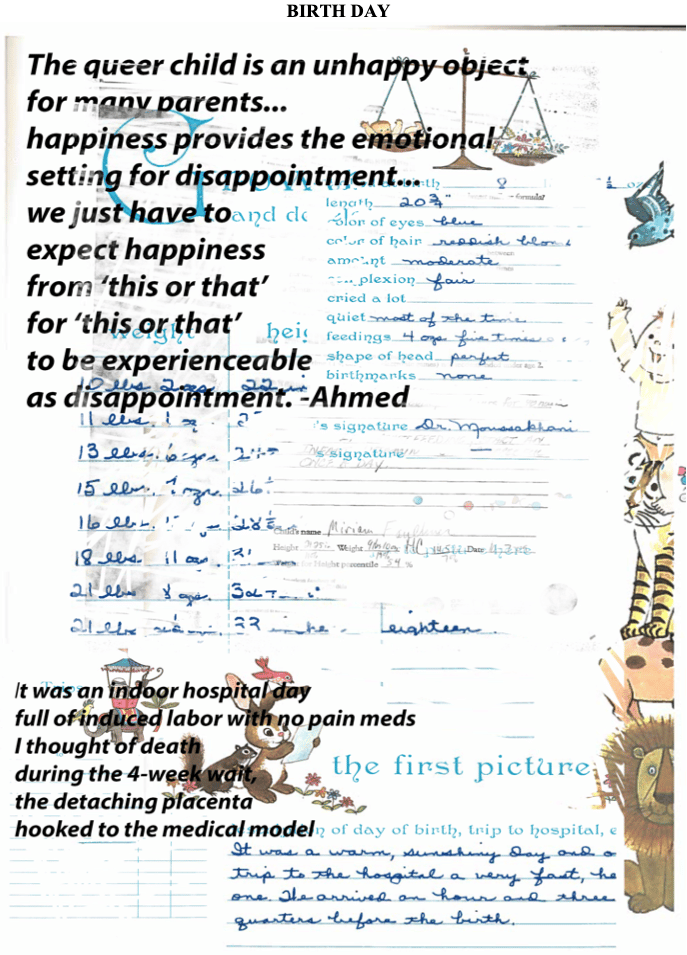
Birth Day
The queer child is an unhappy object for many parents…
happiness provides the emotional setting for disappointment…
we just have to
expect happiness
from ‘this or that’
for ‘this or that’
to be experienceable as disappointment. (-Sarah Ahmed)
It was an indoor hospital day
full of induced labor with no pain meds
I thought of death
during the 4-week wait,
the detaching placenta
hooked to the medical model
Critiquing Dominant Narratives
The resultant erasure collage allows for a range of feelings about pregnancy and critique dominant narratives of pregnancy and childbirth. “Collage could be seen as an enactment of deterritorialization in that creating a collage, one takes something from its recognizable territory and distorts it into new forms” (Smartt Gullion, 2019, p. 163). Using collage as poetic inquiry and Halberstam’s (1998) idea of scavenger methodology, I re-story and create (or distort) a different kind of a baby book, family history, mothering, and mother’s work. A scavenger methodology queers our research endeavors through the combination of different methods that have been traditionally excluded from research on human behavior, especially those that are seemingly oppositional.
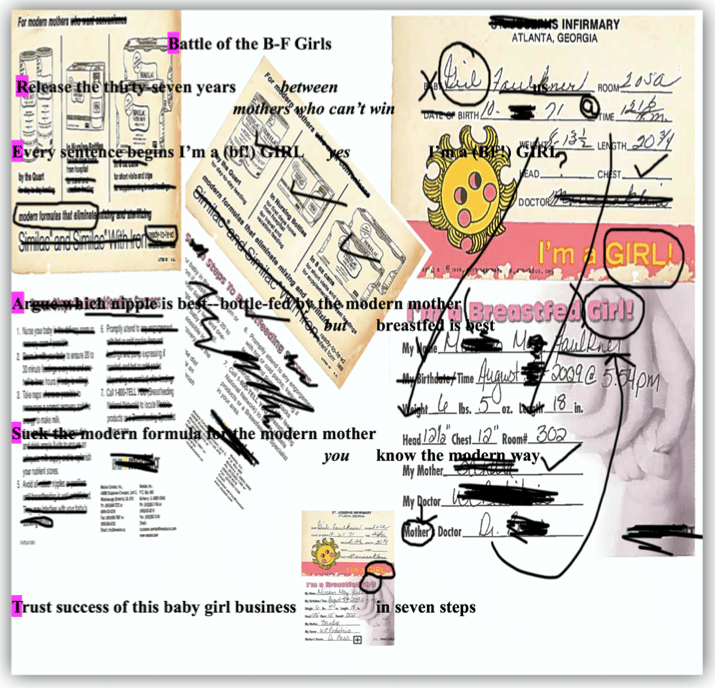
Battle of the B-F Girls
Look at the placards from our hospital cribs,
the directions for breast/bottle
feeding success. The pressure
from the institutions that know
best. You can’t win.
Breast is best, but bottle is modern.
Battle of the B-F Girls
Release the thirty-seven years between us
mothers who can’t win
Every sentence begins I’m a (bf!) GIRL yes I’m a (BF!) GIRL
Argue which nipple is best– bottle-fed by the modern mother
but breastfed is best
Suck the modern formula for the modern mother
you know the modern way
Trust success of this baby girl business in seven steps
bf girl and/or bf girl
The use of nontraditional scholarly materials—poetic language, fiber, family artifacts—and means of presentation and insisting this is research queer what is considered interpersonal communication methodology. “Collage is particularly well suited to arts-based researchers who seek to uncover, juxtapose, and transform multiple meanings and perspectives and to integrate different aspects of a person or phenomena through embodied, multisensorial processes” (Scotti & Chilton, 2017, p. 360). The collage form is a way to play with image and text, to expand the possibilities of text and story to show how poetic inquiry on mothering, family, and cultural history shape the poetic voice and how poetic voice is a form of feminist theorizing and an example of interpersonal feminist scholarship (Manning & Denker, 2015).
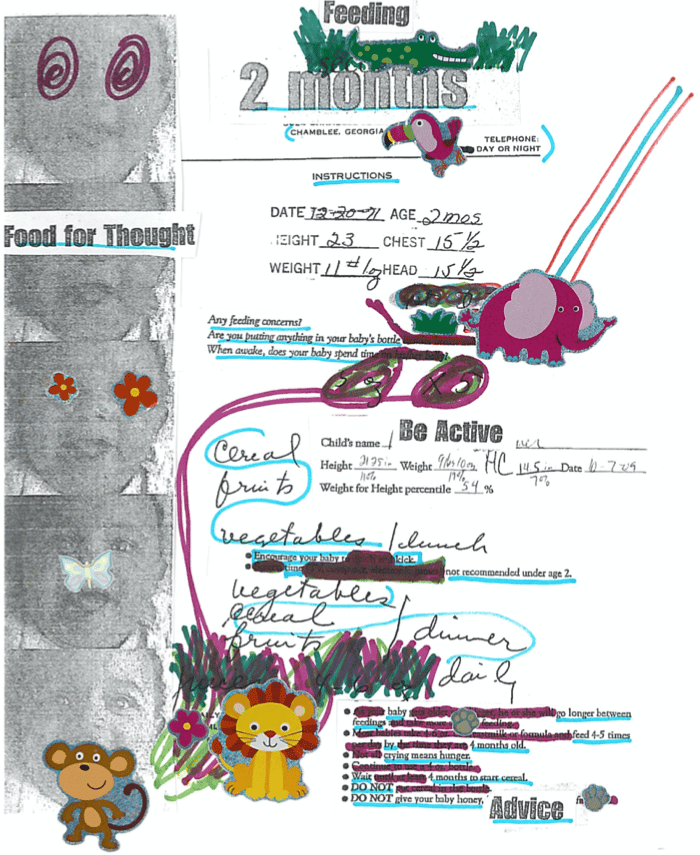
Feeding
2 months
Any feeding concerns?
Are you putting anything in your baby’s bottle
When awake, does your baby spend time
BE ACTIVE
Encourage your baby to kick
time not recommended under age 2
baby go longer between
feedings
by 4 months old
crying means hunger
continue
wait 4 months to start cereal
Do Not
Do Not give your baby honey
Advice
Feeding Concerns?
Concerned feeding.
Feeding the list
of too little,
too much,
and never enough.
The “Baby Book” Collage
In the “Baby Book” collages, I juxtapose images, text, and reflections from my unfinished baby book and my daughter’s never begun baby book in a reimagined scrapbook wherein two mothers—my mother and me—converse in lines of poetry about being mother and the white middle-class expectations of motherhood that mean a mother is never good enough. I use pages from my baby book that my mother filled in, notes from my pediatrician and my daughter’s pediatrician on feeding, sonogram images, and text from feminist theory. Most of the pieces are done in Photoshop, though one of the pieces was an erasure poem made with stickers from the pediatrician’s office and washable child markers.
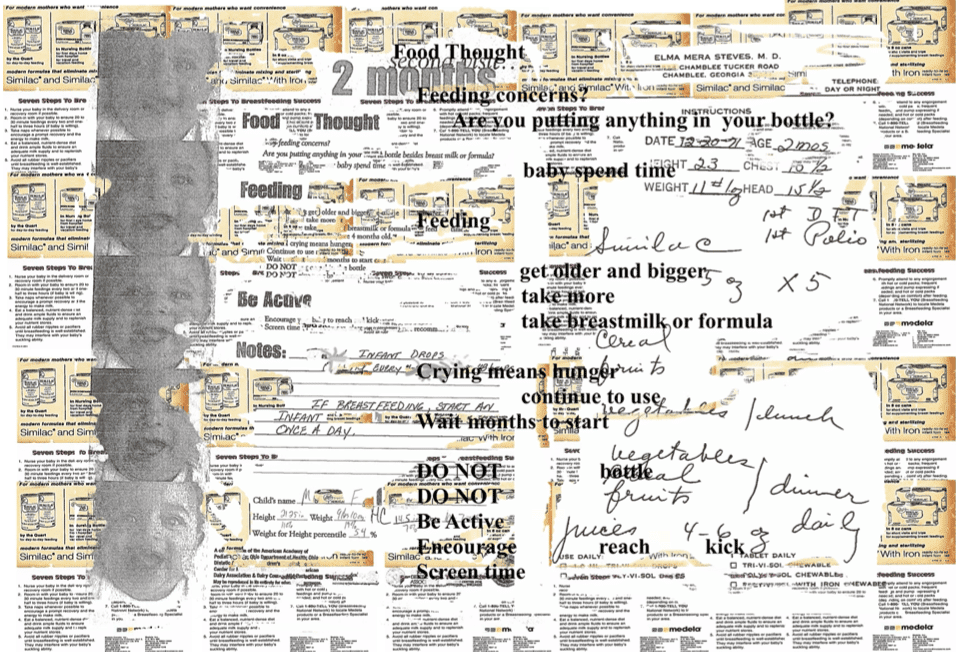
Food Thought
Feeding Concerns?
Are you putting anything in your bottle?
baby spend time
Feeding
get older and bigger
take more
take breastmilk or formula
Crying means hunger
continue to use
Wait months to start
DO NOT bottle
DO NOT
Be active
Encourage reach kick
Screen time
The erasure collages “serve as a kind of queer Pinterest scrapbook that critique and interrogate expectations and attitudes about what mothers should do, think, and feel. Good mothers in a pro-natalist culture should channel their creativity into things like making scrapbooks of their progeny” (Faulkner, 2017, p. 166). Good academics should act as if they do not have children and certainly said children should not disrupt and make messy service, teaching, and research activities (Faulkner, 2012; Huopalainen & Satama, 2018).
The poems show the dialectics of being mother and academic, poet and scholar, feminist and knitter and discourses of good (white) mother and bad mother, feminist academic and everyday mom.
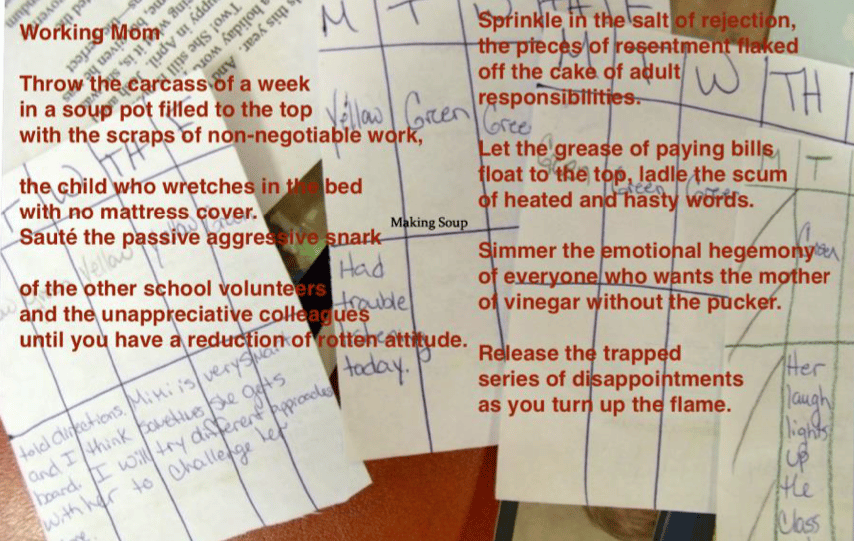
Working Mom
Throw the carcass of a week
in a soup pot filled to the top
with the scraps of non-negotiable work,
the child who wretches in the bed
with no mattress cover.
Sauté the passive aggressive snark
of the other school volunteers
and the unappreciative colleagues
until you have a reduction of rotten attitude.
Sprinkle in the salt of rejection,
the pieces of resentment flaked
off the cake of adult
responsibilities.
Let the grease of paying bills
float to the top, ladle the scum
of heated and hasty words.
Simmer the emotional hegemony
of everyone who want the mother
of vinegar without the pucker.
Release the trapped series of disappointments
as you turn up the flame.
Collage Poetry as Storytelling and Feminist Work
The use of poetry as a form of storytelling and feminist work provides a way to show dialectics and tensions in family life and provide alternatives to the status quo by critiquing taken-for-granted social structures and assumptions about relational life. “The confessional in poetry focuses attention on embodied experience through highlighting dualistic thinking, especially that which focuses on the body, the domestic sphere, and mothering” (Faulkner, 2017b, p. 103).
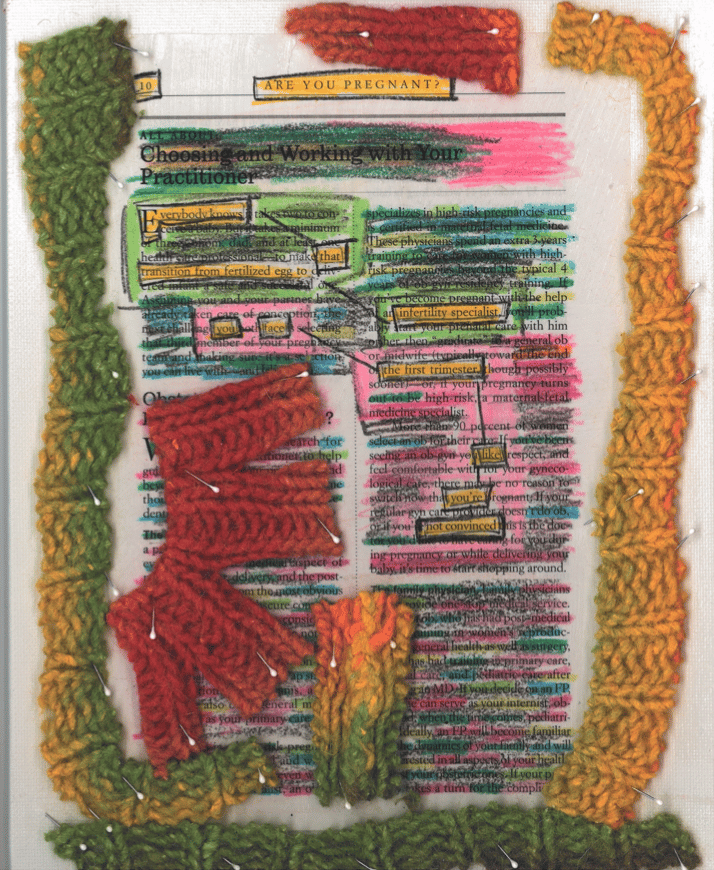
Are You Pregnant?
Everybody knows
that
transition from fertilized egg to
infertility specialist
you face
the first trimester
like
you’re
not convinced
Poetry, as a form, offers a unique way of being able to position and engage dialectics and to uncover taken-for-granted social structures and assumptions about relational life. “Bringing Up Baby” uses erasure to bring forth voices of ambivalence, anger, and disgust not seen in official discourse of pregnancy advice books and medical advice. My positionalities as a white/middle-class/bisexual/ambivalent mother/daughter, academic, romantic partner, and poet influence what I saw in the texts and what I brought out of the shadows. I use erasure as “creative imagination” to remind “us that re-vision is what keeps vision from hardening into dogma.” (Steinorth, 2021, p. xi).
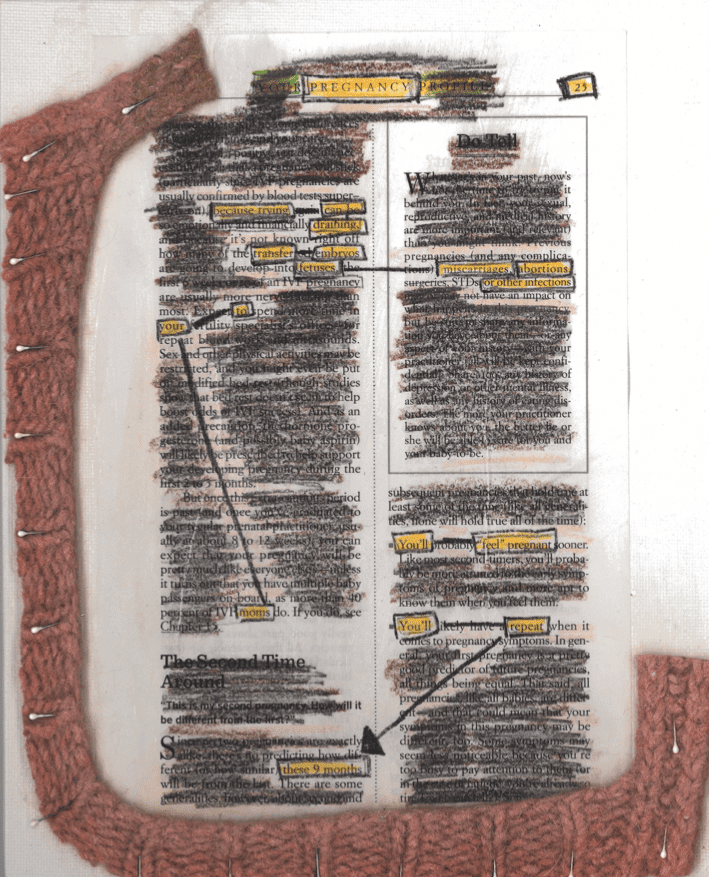
Pregnancy
because trying can be
draining
transfer embryos
fetuses miscarriages abortions or other infections
to
your
You’ll feel pregnant
moms
You’ll repeat
these 9 months
The pieces show places of privilege—leisure time to craft because of job security, having good health insurance, the money to send a child to daycare, and being read as (mostly) a good mother because of being highly educated, white, and partnered. They also show my wrestling with insipid parenting advice and expectations that to be a good (white/middleclass) mother I should spend 110% of my energy and time to turn my child into a baby Einstein. “The most interesting poetry by mothers about motherhood attempts to express the complexity of this multifaceted emotional and physical experience” (Souffrant, 2009, p. 26). I use erasure to free words from “the ossified importance of the authorized” medical community, free them from the dogma of dominant discourse about mothering and motherhood “to imply fresh meanings,” possibilities, understanding (Souffrant, 2009, p. 26).
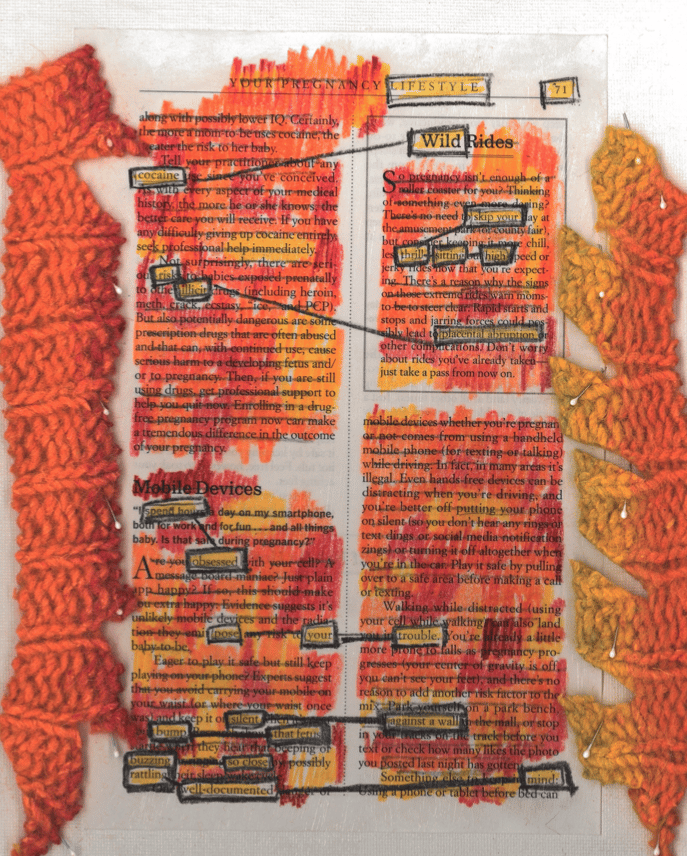
Lifestyle 71
Wild
cocaine
skip your
thrill hitting high
risk
illicit
placental abruption
spend hours
obsessed
pose your trouble
silent against a wall
bump that fetus
buzzing so close
rattling well-documented mind
To conclude, the use of poetry as a form of storytelling and feminist work provides CFIC researchers, teacher, and practitioners with a way to show dialectics and tensions in family life, provide alternatives to the status quo by critiquing taken-for-granted social structures and assumptions about relational life (Suter, 2018). The use of erasure and collage as mother poetry, in particular, shows how this poet scholar wrestled with the ambivalence of too much advice and not enough of the right kind of pregnancy and mothering advice. It shows how mothering and motherhood, writing and being an academic, and being a poet and a partner are not uniformly positive or negative experiences, but experiences that we perpetually write and live into existence (Faulkner, 2016).
Acknowledgements
Source Texts for erasure poems: Murkoff, H. and Mazel, S. (2016). What to expect when you’re expecting (5th ed), p.8. New York: Workman Publishing
.“Feeding”; “Food Thought”; “Bringing Up Baby” first appeared in MotherWork collage (A queer scrapbook). QED: A Journal in GLBTQ Worldmaking, 4(1), 166-179. doi:10.14321/qed.4.1.0166
“Birth Day” first appeared in The Journal of Compressed Creative Arts. http://matterpress.com/journal/
“Battle of the B-F Girls” first appeared in Rat’s Ass Review, 2. Available at http://ratsassreview.net/?page_id=879#Faulkner.
Working Mom appeared as “Making Soup” in Ithaca Lit. Spring 2017. Available at http://ithacalit.com/sandra-faulkner.html
10 ARE YOU PREGNANT? first appeared in Slippery Elm.
“Are You Pregnant?,” “Nine Months,” and “Life Style” first appeared in S/tick Magazine.
Sandra L. Faulkner is professor of communication at Bowling Green State University where she writes, teaches and researches about close relationships. Her interests include qualitative methodology, poetic inquiry, and the relationships among culture, identities, and sexualities in close relationships. Her research focuses on how individuals navigate gender and sexuality through interpersonal communication and personal narrative. She often uses poetry, creative nonfiction, and autoethnography to explore her own negotiation of identity as a parent, partner, and professor. She received the 2013 Knower Outstanding Article Award from the National Communication Association, the 2016 Norman K. Denzin Qualitative Research Award, and the 2020 Trujillo and Goodall “It’s a Way of Life Award” in Narrative Ethnography. https://www.sandrafaulkner.online/ and https://bgsu.academia.edu/SandraFaulkner





